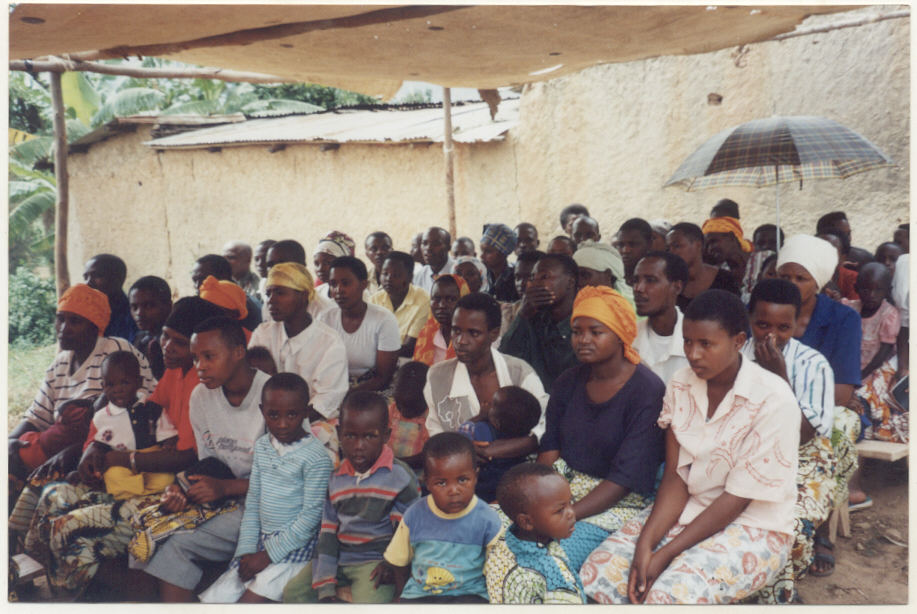Get Ready, Live Ready!
This article recently appeared here for the Evangelical Alliance.
Once I was preaching near the Congolese border. My sermon text was Matthew 25 – the parable of the ten maidservants. Those ten all had a role to play at the wedding, but five of them didn’t have enough oil in their lamps. It’s a straightforward story, and it doesn’t need much explaining. My three points were simply, i) Jesus is coming, ii) nobody knows when, iii) but are you ready? Some responded to my appeal at the end, others didn’t. In any case, two days later I was driving towards their village on my motorbike only to be turned back by a group of soldiers, as killing was taking place up ahead in a rebel attack. It struck me as never before just how urgent a message we have been entrusted with. How many of those who died had accepted or declined the invitation just 48 hours earlier? God knows. For each of those people unfortunate enough to be caught in the crossfire, their time to meet Jesus had indeed come; they hadn’t known when; but the most important issue remained the same – were they ready?

I’ve spent 18 years now living in Burundi. In the early years it was the most dangerous country in the world, and I totally expected to die. I’d counted the cost. I knew Jesus was coming, I knew I was ready, and I wanted to give my all to helping others get ready. There is simply nothing more important to do with our lives.
Yet you’ll only agree with me on that and grasp the urgency of the situation if you believe what the Bible says regarding the eternal destinies of both those who accept and reject Christ’s offer of salvation. Jesus said that “whoever believes in the Son has eternal life, but whoever rejects the Son will not see life, for God’s wrath remains on him” (John 3:36). In 2 Thessalonians 1:8–9, Paul wrote, “He will punish those who do not know God and do not obey the gospel of our Lord Jesus. They will be punished with everlasting destruction and shut out from the presence of the Lord and from the majesty of his power.” Space precludes sharing more verses, but suffice to say there are plenty of them.
The advantage I had was that I was living in a literal warzone. People living in times of peace easily miss the reality that there is a spiritual battle going on. As John Piper explains, “Most people show by their priorities and casual approaches to spiritual things that they believe we’re in peace, not in wartime… In wartime we’re on the alert. We’re armed. We’re vigilant. In wartime we spend money differently, because there are more strategic ways to maximize our resources. The war effort touches everybody. We all cut back. The luxury liner becomes a troop carrier… Who considers that the casualties of this war don’t merely lose an arm or an eye or an earthly life, but lose everything, even their own soul, and enter a hell of everlasting torment?”
There’s a pithy parable about the devil’s training academy for his demonic minions. On the day of the graduation ceremony, he was mingling with the new graduates and questioning them about what they had learnt. He approached one group of three demons and engaged them in conversation. He asked them, “Now that you’re ready to start your mission of leading as many earthlings away from the path of God and into my clutches, what strategy will you use?”
The first demon replied, “Sir, I’ll tell them there’s no God.”
“Rubbish! That won’t work. Creation’s so beautiful that it points to the fact that surely there is a Creator. You won’t dupe many with that one.”
The second one replied, “Sir, I’ll tell them that there’s no judgement.”
“No chance! Come on, we all know that those pathetic earthlings have been endowed with a conscience so that they inherently have a conception of right and wrong. Most know and recognize a coming judgement. That’s not going to work.”
Finally, the third demon replied, “I’ll tell them that yes, there is a God, and yes, there is a judgement, but also that there’s still plenty of time.”
“Excellent! You’ve studied well. Many will be suckers for that lie. Get to it!”
A number of years ago, I came across this obituary: “Died, Salvador Sanchez, 23, World Boxing Council featherweight champion and one of the sport’s best fighters; of injuries after his Porsche 928 collided with two trucks, just north of Queretaro, Mexico. A school dropout at 16, Sanchez explained, ‘I found out that I liked hitting people, and I didn’t like school so I started boxing.’ A peppery tactician, he wore opponents down for late-round knockouts. His record: 43-1-1. ‘I’d like to step down undefeated,’ he said last month. ‘I’m only 23 and I have all the time in the world.’” Like many young people, Sanchez considered himself practically immortal. What a mistake!

My grandfather was a deeply committed, passionate follower of Jesus. He spent 40 years in Africa, experiencing the East African revival first hand as he built the best school of its time in Rwanda, founded the national Scripture Union movement, and translated the Bible into the local language. At his funeral, the speaker said of him, “Peter Guillebaud worked as if he would live forever, and he lived as if he would die tomorrow.” My grandfather knew the stakes were high, and he wanted to do all in his power to rescue as many people as possible. His belief in the reality hell underpinned so much of what he sought to accomplish. And in turn for each one of us, the awareness of the reality of hell will deepen our sense of gratitude to God for sending Jesus to die in our place; it will increase our compassion for the lost; it will heighten our urgency in communicating the gospel; it will sharpen our intercession; it will stir up a righteous hatred of sin; it will spur us on in prioritizing mission and evangelism.


No Comments
Well said Simon…..and we are all “guilty” at some level…at some times! So thank you for the sparks….for the flame! Get ready….be ready….stay ready!
Thank you, Simon. As always…straight to the heart.
Wish I could have met your grandpa. But then again, I think I see him, even more passionately, in you, Simon. Thank you for your servant’s heart on fire. You encourage me to water down well meaning Christian’s advise to not offend others with the certainty and damnation of hell truth! All the while, gaming the flame of God’s crazy, incomparable love for his creation. When you’re coming to the U.S., please give me a heads up so I can welcome you and your family. I could be your guide to our Great Lakes! City of Chicago or BEEUTIFUL Midwest and Mississippi River valley flora, fauna and rivers.
We met in Alaska in 2011/12
God bless.
Gina
Wow thank you so much Brother Simon for this encouraging and challenging message, your life and commitment to the work of God is a powerful message to me and to the ministry I’ve been called to do in this country and elsewhere, just by reading your report I feel like my level of commitment to mission and evangelism is taking another step because, I knew how short my life was but I just realized how it is even shorter than I thought, my heart is on the mission outreach evangelism I am now going to maximize my time and do more to rescue some souls for The Lord. Apollinaire